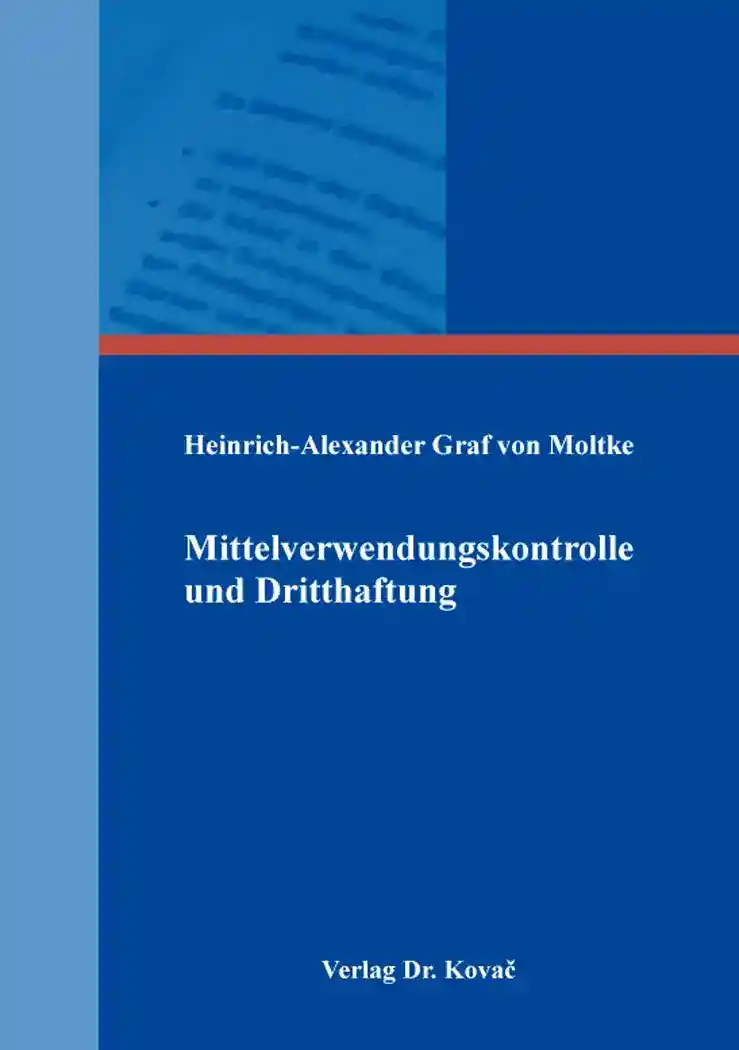Heinrich-Alexander Graf von MoltkeMittelverwendungskontrolle und Dritthaftung
Studienreihe wirtschaftsrechtliche Forschungsergebnisse, Band 208
Hamburg 2019, 472 Seiten
ISBN 978-3-339-11118-0 (Print)
ISBN 978-3-339-11119-7 (eBook)
Zum Inhalt deutschenglish
Die Mittelverwendungskontrolle ist ein Schutzinstrument, das nach seiner Grundfunktion dem Schutz sowohl der Anleger als auch der Anlagegesellschaft vor Fehlleitungen des Vermögens der Anlagegesellschaft durch die Geschäftsführung dient. Obwohl sie aufgrund des mit ihrer Einrichtung verbundenen Aufwands zumeist im Rahmen von Kapitalanlagen in Erscheinung tritt, ist ihr Anwendungsbereich nicht darauf beschränkt. Von den gesetzlichen Spezialfällen abgesehen, ist sie insbesondere in der notariellen Verwahrung, aber auch in idealistisch motivierten Förderungsmodellen wiederzufinden.
Das im Mittelpunkt dieser Untersuchung stehende Problem ist im Grundsatz nicht unbekannt: Ein Anleger investiert in ein Anlageprojekt, dieses Anlageprojekt scheitert, der Anleger versucht, seinen Verlust zu minimieren, indem er Schadensersatzansprüche geltend macht. Führt das Scheitern des Anlageprojekts zur Insolvenz des Anlagevehikels, versucht der Anleger seinen Schaden gegenüber einem anderen, solventen Haftungsadressanten geltend zu machen. Die an dem Anlageprojekt Beteiligten rücken in den Mittelpunkt der Aufmerksamkeit und dabei zunehmend auch der vertragliche Mittelverwendungskontrolleur.
Da die Mittelverwendungskontrolle im Regelfall von Personen mit besonderer beruflicher Qualifikation vorgenommen wird, gliedert sich die Studie ein in die rechtsdogmatische Diskussion um die Grundlage einer Experten- und Berufshaftung. Ausgangspunkt ist die Frage, ob und auf Basis welchen Rechts eine Person gegenüber einem Dritten auf vertraglicher oder quasivertraglicher Ebene für Schäden haftet, während eine Vertragsbeziehung lediglich mit einer anderen Person besteht. Dabei ist eine deliktsrechtliche Haftung nach den Vorschriften der §§ 823 ff. BGB ebenso in Betracht zu ziehen wie eine vertragliche oder quasivertragliche Haftung des Mittelverwendungskontrolleurs.
Während im ersten Teil die verschiedenen Ausgestaltungsmöglichkeiten und Formen der Mittelverwendungskontrolle und die damit verbundenen Rechtsprobleme vertieft behandelt werden, ist der zweite Teil der Studie der Dritthaftung des Mittelverwendungskontrolleurs gegenüber den Anlegern vorbehalten.
The control of the use of funds is a protective instrument which, according to its basic function, serves to protect both the investors and the investment vehicle against misdirection of the assets of the investment vehicle by its management. Although it mostly appears in the context of capital investments due to the expenses associated with its establishment, its scope of application is not limited to capital investments. Apart from the special cases regulated by law, it can be found in particular in the notarial custody but also in idealistically motivated funding models.
The central problem to be analyzed with in this study is not unknown in principle: An investor invests in an investment project, this investment project fails, the investor tries to minimize his loss by asserting claims for damages. If the failure of the investment project leads to the insolvency of the investment vehicle, the investor tries to assert his damages against another, solvent party. Those third parties involved in the investment project move into the center of attention and with it increasingly also the contractual controller of the use of funds.
Since the control of the use of funds is usually carried out by persons with special professional qualifications, this study is part of the legal-dogmatic discussion on the basis of expert and professional liability. The starting point is the question of whether and on what basis a person is liable to a third party for damages on a contractual or quasi-contractual level, while a contractual relationship exists only with another party. Liability under tort law in accordance with the provisions of §§ 823 et seq. of the German Civil Code (BGB) is to be considered as well as a contractual or quasi-contractual liability of the controller of the use of funds.
While the first part of this study examines in-depth the various possibilities for the design and forms of controlling the use of funds and the associated legal problems, the second part of this study is reserved for the third-party liability of the controller of the use of funds vis-à-vis investors.
Schlagworte
DritthaftungKapitalmarktrechtMittelverwendungskontrolleSchutzwirkung zugunsten DritterTreuhänderVertrag zugunsten DritterVerwahrstelleWirtschaftsrechtZeichnungsschadenZivilrechtIhr Werk im Verlag Dr. Kovač
Möchten Sie Ihre wissenschaftliche Arbeit publizieren? Erfahren Sie mehr über unsere günstigen Konditionen und unseren Service für Autorinnen und Autoren.
